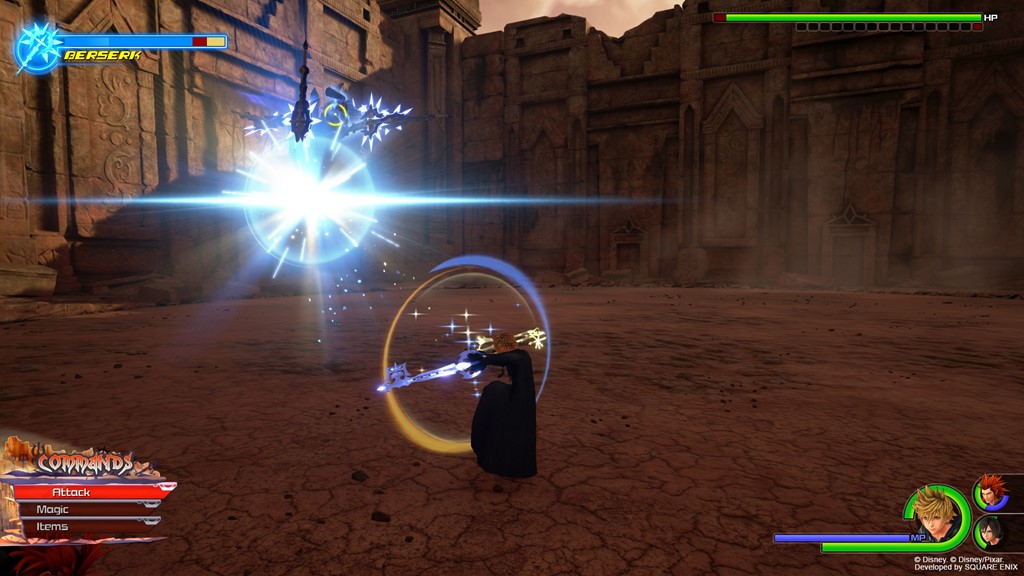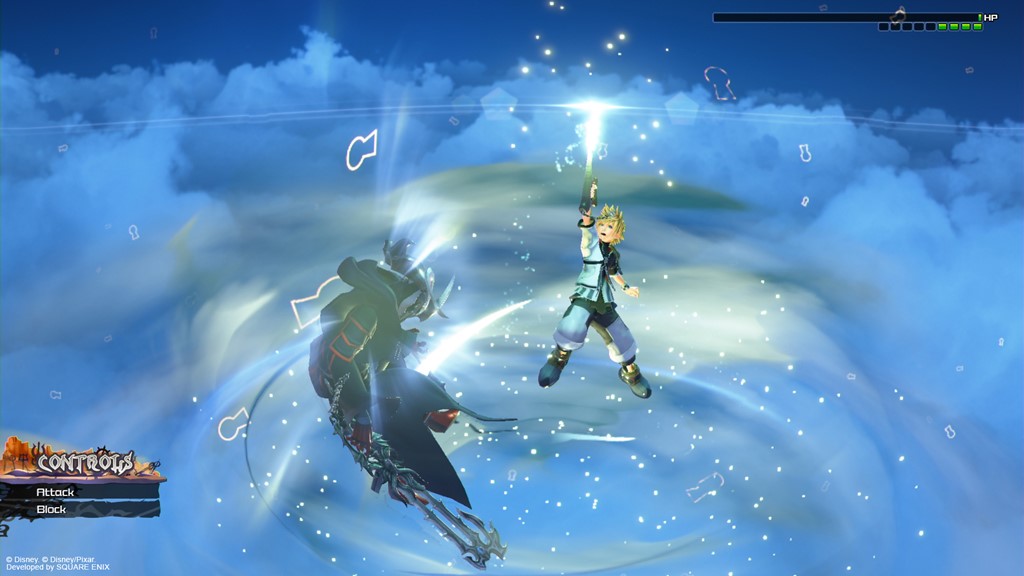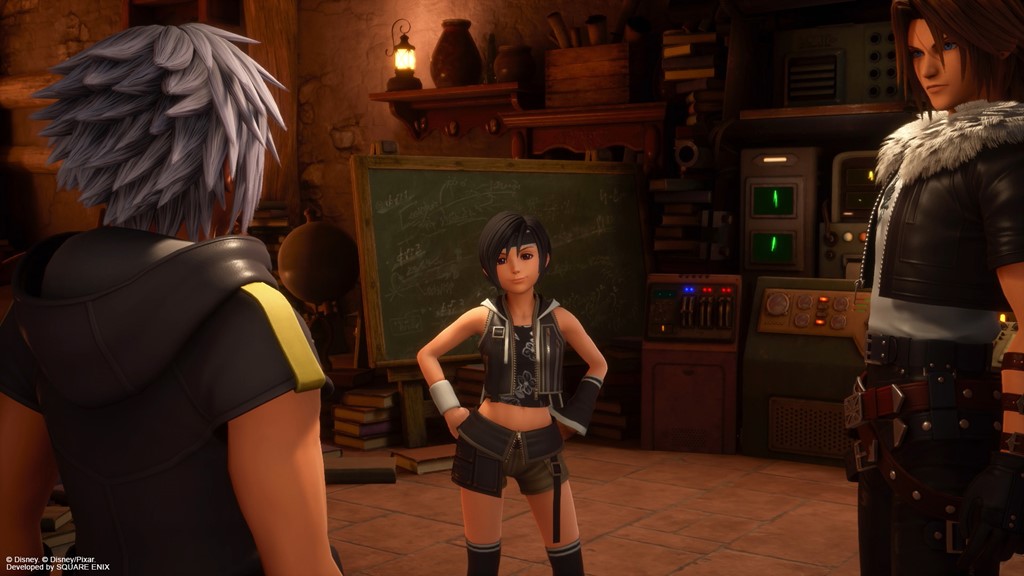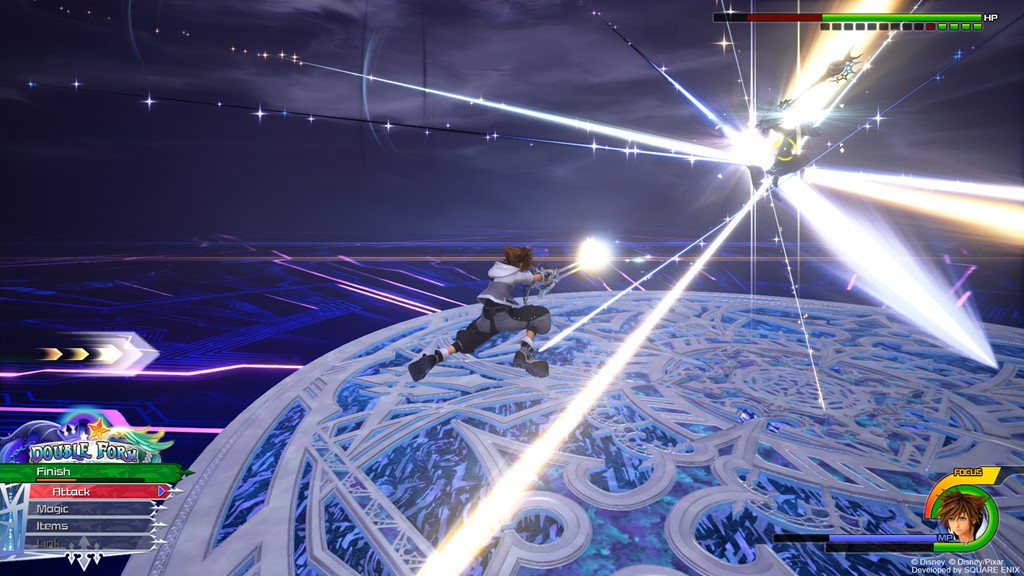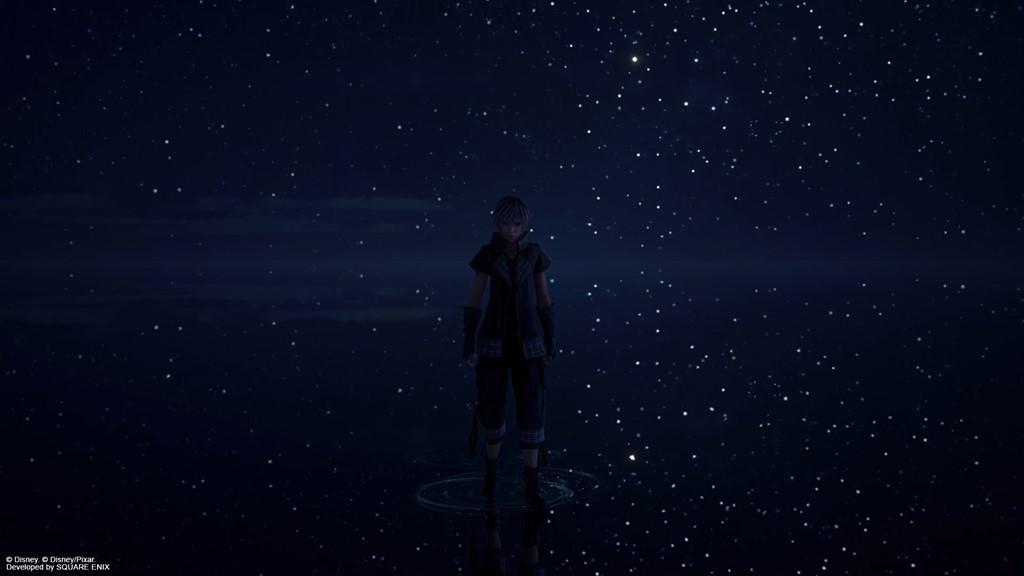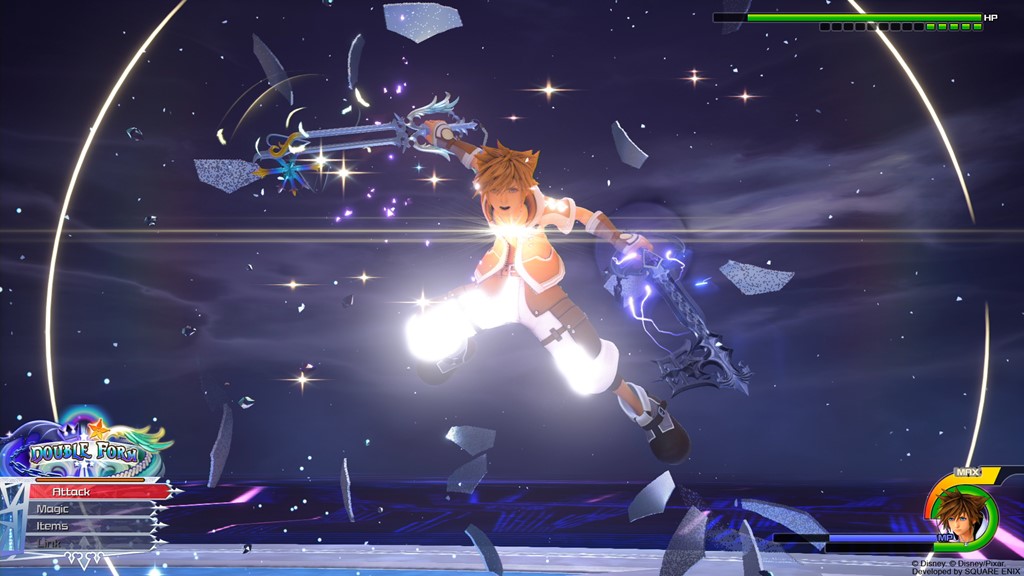Kingdom Hearts originally swept the world for its endearing mix of Final Fantasy and Disney while somehow managing to capture its own unique identity and charm. The third game in the series (ninth overall, counting the non-numbered, yet narrative-crucial entries) pushed the Final Fantasy connections aside in favor of focusing entirely on Disney worlds and the conclusion of the Xehanort (or Dark Seeker) Saga’s near-nonsensical story. Even then, Disney worlds felt like filler as opposed to critical parts of the finale’s story. Kingdom Hearts III Re:MIND closes out the saga with a pure focus on the narrative, meaning it wholly shoves Disney to the side (apart from brief yet epic appearances by King Mickey, Donald, and Goofy) in favor of retreading the final hours of Kingdom Hearts III’s main campaign.
The Re:MIND story campaign is essentially a director’s cut version of Kingdom Hearts III’s conclusion. It’s confusingly presented (it wouldn’t be Kingdom Hearts if it wasn’t) but the basic gist of the story is in an attempt to save Kairi, Sora’s heart travels back in time through the hearts of his friends as they battle Organization XIII members in the Keyblade Graveyard. This ending redux is more or less the same as the final few hours of the main game. There are a few new scenes and noteworthy epic moments, and it manages to fill in a lot of the holes that were present in the regular ending, but it felt more like a small update designed to adjust the game’s final moments, not a massive story DLC priced at half the cost of a brand new game.
What the Re:MIND campaign does well is hand the spotlight to characters and moments that got glossed over originally. You’ll have the opportunity to step into other keyblade wielders’ shoes for those Organization XIII battles. Roxas, Aqua, Riku, and even Kairi are briefly playable during very the specific fights they are a part of. They have some unique abilities and fighting styles, but the fights largely play out exactly the same as they did in the normal game, and because I had already gotten Sora to level 99, I mostly button-mashed my way through every fight…again. There are some great battle interactions that highlight relationships between certain characters—the synergy between Aqua and Ventus, Roxas and Xion, and Kairi and Sora were all full of over-the-top energy.
Sora inhabiting the hearts of his friends means that he gets to witness character interactions unseen in the normal ending. These are played out in cutscenes, however, and they come along with full cutscenes that you’ve already watched in the main game. In fact, so much of Re:MIND’s campaign is recycled that I was initially confused as to why Square Enix was charging $30 for people to… just play the end of the game again. There are a few expanded gameplay sections—like getting to explore more of Scala ad Caelum—and new boss fights, but turning around and playing Re:MIND after beating Kingdom Hearts III is like watching Return of the King’s extended edition right after finishing the full normal Lord of the Rings trilogy. The time travel element feels more like an excuse to fill in holes left in the main game than it does a critical plot point. Re:MIND’s campaign is effectively how Kingdom Hearts III should have ended to begin with, not as a $30 add-on.
Enter the Datascape
The main Re:MIND campaign is complemented by Limitcut, a new episode that unlocks upon finishing Re:MIND. Limitcut has a loose story around it, shoehorning in the Final Fantasy characters that were notoriously absent from the main game. It’s one year later and Sora is still missing. His friends are looking for any clues that might help locate him. Aerith, Leon, and Yuffie’s roles amount to standing around while Riku briefly delivers exposition. Cid works at the computer, compiling combat data from Sora and the Organization XIII members. With the Organization members’ data locked down, they get the genius idea to pit Sora’s combat data against the Organization in the Datascape in order to unlock the files.
Limitcut is basically a boss rush, an unabashedly difficult set of fights against all the members of Organization XIII. It’s not just a steep difficulty ramp, either. Limitcut is basically a wall for all but the most hardcore of Kingdom Hearts players. Where the entire main game—and even the Re:MIND campaign—presented barely a challenge, suddenly needing to know how to use the block button and special combos with expert precision created an immense amount of frustration. Bosses repeatedly stun-lock you, juggling data-Sora in the air while pressing him against the edge of the arena.
This expansion needs to re:mind players how combat works beyond just mashing the “attack” command and occasionally healing because this will be the point at which many people shut off the game and never revisit it again. Especially after over half a year since I obtained the Kingdom Hearts III Platinum trophy and deleted the game, I had legitimately forgotten there was even a block button. Limitcut takes the game from zero to 60—no, from zero to 250—without any warning except for the wailing of fans online who can’t overcome the absurdly difficult boss encounters.
I enjoy a good challenge in a game when I am meaningfully given the tools to learn and overcome. I absolutely loved Sekiro, for example, for the way it taught players exactly why they failed. The Limitcut boss battles do have a certain amount of learning and adapting that can be done, but so much of it is high-level and beyond the game’s basic mechanics, taking Kingdom Hearts far from the action-RPG it began as in 2002. Victory doesn’t come from strategy or tactical battle planning but pixel-perfect blocking and combos that the game isn’t exactly clear about. Failure should send a clear message: “You did this wrong. Now try again.” Here it’s just saying, “I know you were trying to dodge the unblockable attack while blocking the undodgeable attack, so we threw a third unspecified attack at you to mix things up a bit more completely obliterate you without regard for your mental wellbeing.”
Some players will have the patience for it, many more will say “forget this,” and start playing Luigi’s Mansion 3 again instead. (That was me. That’s what I did.) After many hours of trying and retrying, I’ve managed to take down a few of them. In a game like Sekiro, the feeling of beating a tough boss is rewarding. Here it simply feels like I got a few lucky hits in and somehow managed to heal enough to last until the end. It’s a relief to be certain, but I don’t feel like it was an accomplishment or something I could reliably execute again except to mash buttons and pray for luck. In fact, in many cases, my button mashing got me closer to victories than actually trying (and failing miserably) to block and dodge the absolute cavalcade of attacks that were sent my way.
Even if you love this kind of perfectly-timed action slasher gameplay, Limitcut is still just a series of reprised bosses that you’ve already fought in the main game multiple times, and then some of them again in the Re:MIND campaign, and now again in the datascape. The only inherently new boss fight is tucked away behind managing to beat the data versions of every Organization XIII member.
Kingdom Heart’s III’s Secret Episode – The Future of Kingdom Hearts
Yes, there’s even something more locked behind beating all 13 Datascape bosses. Once you finish the Limitcut episode, it unlocks the third part of the Re:MIND DLC, aptly titled the Secret Episode. It’s not so much a secret as it is really, really hard to even get to in the first place. The secret episode expands on the secret ending from the main game and hints heavily at the direction Kingdom Hearts is likely to head in the future (tie-ins and crossovers with other Square Enix games, most notably a stronger connection with Final Fantasy). It also features the DLC’s Secret Boss, who, once again, isn’t so much secret as it is just difficult to even unlock. Of course, I don’t know about any of this firsthand because I can’t even get to it myself.
It’s unfortunate that such a seemingly crucial bridge to where the series is going post-Xehanort is not only locked away behind an expensive DLC chapter but insanely difficult fights that a good majority of players will never see through to the end. I plan to keep on chipping away at them so I can see the Secret Episode and boss for myself, but I’m not exactly enjoying my time doing so.
If you spend an extra $10 for the Concert Edition of Re:MIND, you’ll get the World of Tres Orchestra concert videos, a series of videos that intersperse the concert footage with scenes from the game. It’s a beautiful arrangement of music from across the Kingdom Hearts series, and I’m always impressed with live music performances. The videos are only playable from directly within Kingdom Hearts III though, so the question of if this is worth it to you will depend on your particular love of music. I’ve been playing them in the background while writing this review (also a great way to cool down after some particularly frustrating Limitcut battles), but I can’t see myself booting up Kingdom Hearts III in the future with the sole intention of watching the concert footage.
Kingdom Hearts III Re:MIND is a director’s cut replay of the main game’s finale followed by a series of absurdly difficult and often seemingly unfair boss fights, and fails to justify its hefty $30 price point. The main Re:MIND campaign fills in the gaps and shines a spotlight on the underappreciated characters and relationships from the main game. Returning Final Fantasy characters feel shoehorned in to provide a “story” element to the boss rush of Limitcut, while the DLC’s real treat—the Secret Episode—is locked behind a series of near-impossible tasks. There are many redeemable elements of Re:MIND. Its main campaign fills out Kingdom Hearts III’s ending, and King Mickey is just an epic badass. But unless you’re a glutton for punishment, it’s probably better to just catch up on the story elements via YouTube and await news of the next game in the series.
Kingdom Hearts III Re:MIND review code provided by publisher. Reviewed on a launch PS4. For more information on scoring, please read our Review Policy.
This page contains affiliate links to products. Purchases made using these links help support PlayStation LifeStyle.
-
Great moments that serve as a director's cut to Kingdom Hearts III's finale
-
Expands on characters and relationships from the main game
-
Epic King Mickey
-
The Secret Episode... if you can unlock it
-
A lot is recycled and retreads the same ground
-
Limitcut difficulty spike is absurd
-
$30 launch price feels like a big ask

